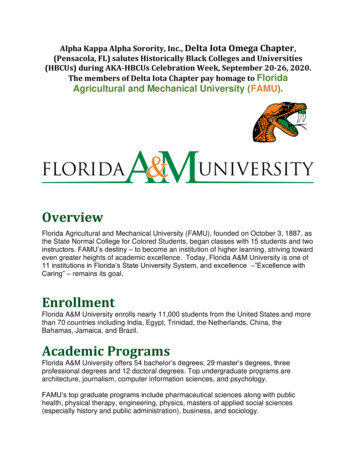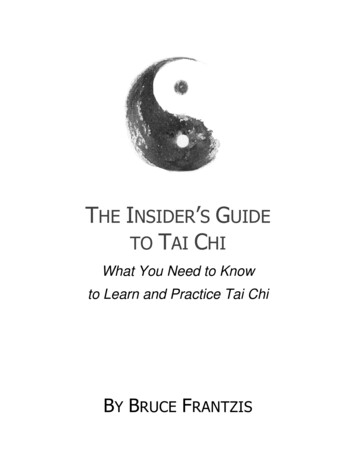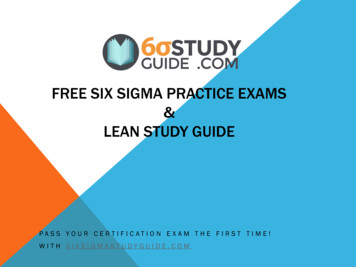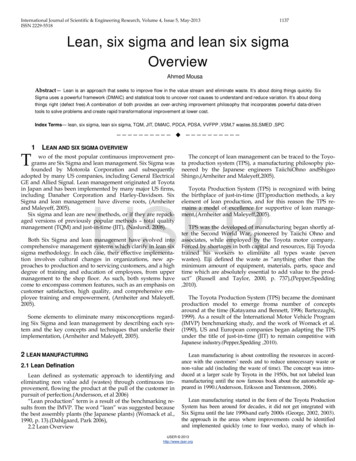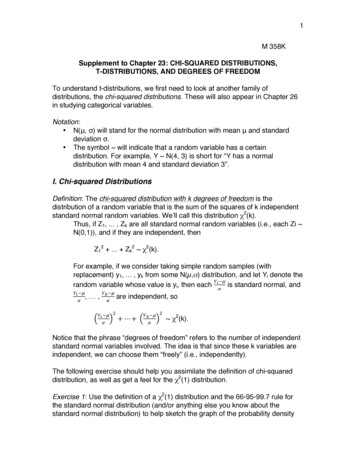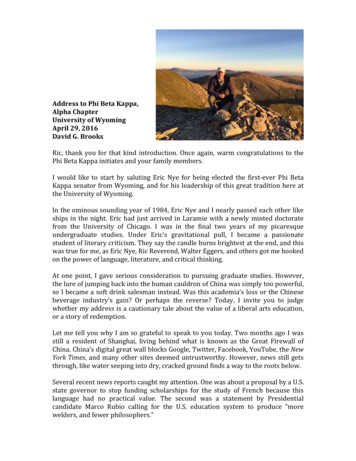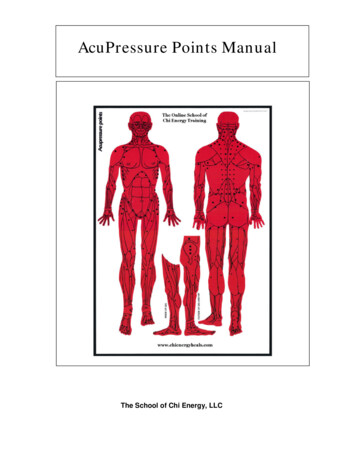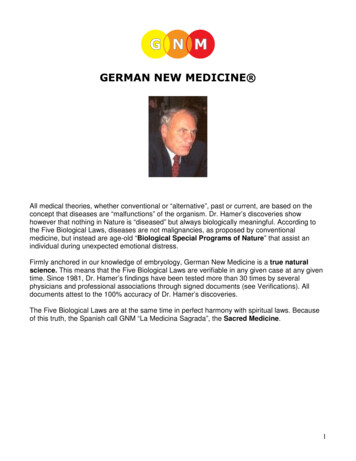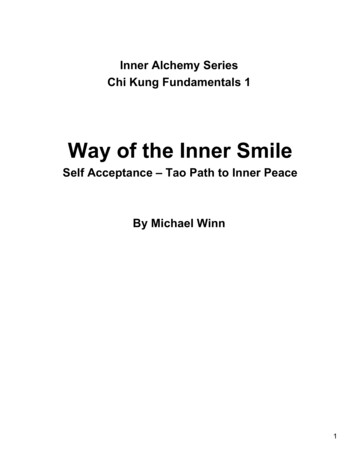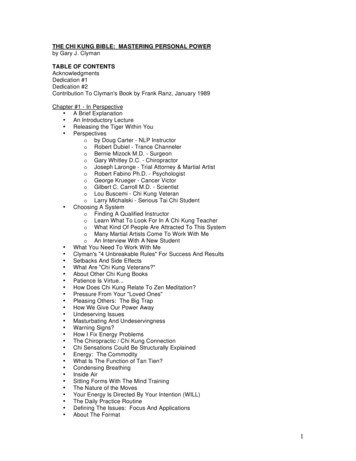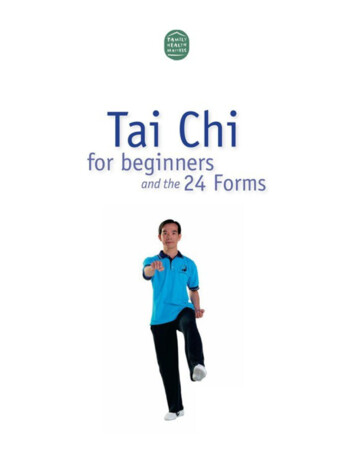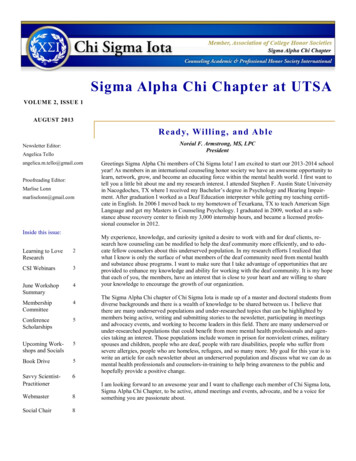
Transcription
Sigma Alpha Chi Chapter at UTSAVOLUME 2, ISSUE 1AUGUST 2013R ea d y, Wi l l i n g , a n d A b l eNoréal F. Armstrong, MS, LPCPresidentNewsletter Editor:Angelica Telloangelica.m.tello@gmail.comProofreading Editor:Marlise Lonnmarliselonn@gmail.comInside this issue:Learning to LoveResearch2CSI Webinars3June larships5Upcoming Workshops and Socials5Book Drive5Savvy ScientistPractitioner6Webmaster8Social Chair8Greetings Sigma Alpha Chi members of Chi Sigma Iota! I am excited to start our 2013-2014 schoolyear! As members in an international counseling honor society we have an awesome opportunity tolearn, network, grow, and become an educating force within the mental health world. I first want totell you a little bit about me and my research interest. I attended Stephen F. Austin State Universityin Nacogdoches, TX where I received my Bachelor’s degree in Psychology and Hearing Impairment. After graduation I worked as a Deaf Education interpreter while getting my teaching certificate in English. In 2006 I moved back to my hometown of Texarkana, TX to teach American SignLanguage and get my Masters in Counseling Psychology. I graduated in 2009, worked at a substance abuse recovery center to finish my 3,000 internship hours, and became a licensed professional counselor in 2012.My experience, knowledge, and curiosity ignited a desire to work with and for deaf clients, research how counseling can be modified to help the deaf community more efficiently, and to educate fellow counselors about this underserved population. In my research efforts I realized thatwhat I know is only the surface of what members of the deaf community need from mental healthand substance abuse programs. I want to make sure that I take advantage of opportunities that areprovided to enhance my knowledge and ability for working with the deaf community. It is my hopethat each of you, the members, have an interest that is close to your heart and are willing to shareyour knowledge to encourage the growth of our organization.The Sigma Alpha Chi chapter of Chi Sigma Iota is made up of a master and doctoral students fromdiverse backgrounds and there is a wealth of knowledge to be shared between us. I believe thatthere are many underserved populations and under-researched topics that can be highlighted bymembers being active, writing and submitting stories to the newsletter, participating in meetingsand advocacy events, and working to become leaders in this field. There are many underserved orunder-researched populations that could benefit from more mental health professionals and agencies taking an interest. Those populations include women in prison for nonviolent crimes, militaryspouses and children, people who are deaf, people with rare disabilities, people who suffer fromsevere allergies, people who are homeless, refugees, and so many more. My goal for this year is towrite an article for each newsletter about an underserved population and discuss what we can do asmental health professionals and counselors-in-training to help bring awareness to the public andhopefully provide a positive change.I am looking forward to an awesome year and I want to challenge each member of Chi Sigma Iota,Sigma Alpha Chi Chapter, to be active, attend meetings and events, advocate, and be a voice forsomething you are passionate about.
SIGMA ALPHA CHI CHAPTER AT UTSALearning to Love Research: One Student’s JourneyYuliya ZholuPresident ElectAs I am finishing up the third semester in the community counseling program and embarking on the second year of education, Iwanted to take a moment and reflect on the diverse and enriching educational experience of this past year. It is hard to imaginethat only a year ago I began the journey of a graduate student not knowing what opportunities lay ahead. This past year was fullof new endeavors, meetings with new people, forming friendships, studying new subjects, and developing new interests. I can’twait to see what happens next year!From the beginning of the program, I wanted to have an opportunity to work under the supervision of a faculty member and engage in some sort of research project. My goal was to hone my research skills and prepare for the next step in my educationaltrajectory, the doctoral degree. I understood that a better understanding of academic research would allow me to consider a widerrange of careers upon the graduation from the program, as well as prepare me for a doctoral program. At that time my interestwas aligned with a clear understanding of what I needed to accomplish and what credentials I needed to accrue in order to moveforward successfully. In a way, I was going through a checklist of academic experiences I was required to obtain. Undoubtedly, Iwas determined to stay on course and satisfy all the requirements. If I only knew that my calculated resolute and businessminded pragmatism would blossom into a full-fledged passion in academic research just a year later, I probably would not believe it myself. But it did! And here is how it happened!In the first semester of the program, I approached Dr. Karcher, the professor who was teaching the counseling theories class atthe time, and shared with him my aspirations of pursuing a doctoral degree. I expressed interest in helping him with any type of aresearch project that he was working at the time or considering in the future. I explained that I needed to gain experience in research in order to be a more marketable applicant. I found out that another peer from the program, Joe Avera, had similar interests in acquiring research skills in the counseling field. Based on our active participation in class and excellent grades Dr.Karcher invited us, along with two other peers, to help him with his book. Around the same time, Dr. Karcher learned of a longitudinal study begging to be conducted on a seminal research project done in the 1970s. This discovery coincided with an announcement for a grant proposal from the Office of Juvenile Justice and Delinquency Programs (OJJDP) that was looking tofund a study on at-risk behavior.As soon as we learned of Dr. Karcher’s interest in submitting a proposal for the OJJDP grant, Joe and I jump at the chance tohelp him with the proposal. Luckily we had little idea what grant proposal meant entailed or what type of commitment it wouldrequire; we were just eager to learn. Both of us spent several weeks assisting Dr. Karcher writing the proposal while attending tothe full load of graduate school. Needless to say, we had to juggle a lot in order to stay on track, maintain our grades and attendto lives outside of school. I recall that we had to stay up late many nights pulling together all the pieces for the proposal and conducting countless conference calls. Working on the proposal allowed us to become familiar with Dr. Karcher’s extensive work inthe mentoring field. We communicated with Dr. Gerald Goodman, an emeritus professor at the University of California, and theauthor of the mentoring program conducted in 1970s that Dr. Karcher wanted to follow up on. Reading about Dr. Goodman’sstudy and the two studies conducted by Dr. Karcher, we grew increasingly interested in the longitudinal research on youth mentoring; we were personally interested in winning the grant so we could continue the study.As soon as we submitted the proposal, Dr. Karcher received the e-mail from the OJJDP informing of the nascent governmentcuts that could potentially seize the funding of the research. Understanding the implication of this follow up research, we startedthinking of the alternative ways to move forward. Around the same time Dr. Karcher informed us of the UTSA’s Provost Summer Research Mentor Program. It is a seven-week program organized by the Provost office of the UTSA that aims to preparestudents for the competitive graduate school admission and to build skills in research, which could help them succeed in the program. We clearly understood the value of this program for us: it was an opportunity to start Dr. Karcher’s longitudinal study on asmaller scale. We submitted our applications stating why we want to be accepted and what type of research we intend to conductand about few weeks later were accepted in the program.(Continued on Page 3)PAGE 2
VOLUME 2, ISSUE 1Learning to Love Research ContinuedDr. Karcher had access to some data from two large-scale mentoring studies he conducted 10 and 13 years ago: the Cross AgeMentoring Program (CAMP) peer mentoring study and the Study of Mentoring in the Learning Environment (SMILE) adults inschools youth mentoring study. Because of my interest in peer mentoring and in order to differentiate research work in the summer program, I focused on the CAMP study and Joe, on the SMILE study. Our goals were to evaluate the long-term effects ofthe cross-age and school-based mentoring relationships on at-risk behaviors of mentees who participated in both studies.Parallel to the on-going research, we both attended weekly professional development seminars and presentations. The content ofthe seminars centered on the information about graduate school admission, as well as the tools we needed to succeed in the program. Weekly, we had an opportunity to meet up with the peers who were enrolled in the Summer Research Program and checkon the status of their research projects. With only seven students in the program, each one of us received a great level of attentionfrom PSRMP staff and especially two people who were highly involved in the program, Lisa Palacios and Dr. David Romero.During this summer program, Dr. Karcher guided our research, provided us with necessary tools, and monitored the data collection. As a result, we have been able to collect publicly available criminal data for both studies and run some preliminary analysis.We are hoping that in the next several weeks we can start reporting the findings of our work. On the last day of the program,each participant had to present the findings of his or her research in front of several faculty members of the university, their mentors, as well as friends and families.This experience in UTSA’s Provost Summer Research Mentor Program allowed me to hone my research skills, it equipped me withknowledge I will need in the doctoral program, and most importantly it invigorated a genuine interest in conducting research in thefield of counseling. I am grateful for the opportunity to be a part ofthis amazing program that UTSA offers to its students and to ourmentor, Dr. Karcher, who recognized our aspirations and dedicatedhis time and energy to ensuring that we took the most out of theprogram and the research. His passion for mentoring and profoundknowledge of quantitative research afforded for a truly wonderfuleducational experience. And this is just the beginning of the research journey!Joe Avera, Yuliya Zholu, and Dr. KarcherCSI WebinarsCSI members may receive free CEUs for participating in the webinars. For webinar descriptions, CEUinstructions, and registration information, please visit the main CSI website at www.csi-net.org.Your Supervision Question: Its Impact on Supervision Model SelectionDr. Lori Russell-ChapinTuesday, September 3, 20132:00 PM - 3:00 PM ESTInfusing Intentionality and Reflection in Counselor Community Engagement Activities: A Modelfor Chapter LeadersDr. Cassie StorlieFriday, September 13, 201312:00 PM - 1:00 PM ESTStrategies for Involving Alumni and Professional Members in CSI Chapter ActivitiesMr. Stephen Kennedy, Dr. Barbara Mahaffey, and Dr. Jill Duba SauerheberTuesday, September 24, 20132:00 PM - 3:00 PM ESTPAGE 3
SIGMA ALPHA CHI CHAPTER AT UTSAJune Workshop Summary: Strategies to Prevent Counselor BurnoutMarlise R. Lonn, MS, LPC-S, NCCTreasurer & Awards ChairIn June, Dr. Paul Carrola presented “Strategies to Prevent Counselor Burnout.” Hediscussed how counselor burnout is defined in the professional literature, the characteristics of burnout, and prevention strategies. Pay attention and seek consultation or personal counseling if you begin to feel emotionally exhausted, begin todepersonalize or devalue clients, have a stressful work environment, and see deterioration in your personal life. Awareness of counselor burnout is important because it can contribute to counselor impairment. To prevent burnout, maintainhealthy boundaries around your work-life, be aware of vicarious traumatizationand seek additional supervision when you experience it. Develop a supportiverelationship with a supervisor, and utilize your counseling skills – treat yourself asyou would your client – compassionately assess if you are you thinking clearly andif your goals and expectations realistic? Are you taking a solution focused approach with yourself? Dr. Carrola also provided examples and insight based on hisexperience working as a professional counselor in both the prison setting and as acontract counselor with an agency. Dr. Carrola received both his M.A. and hisPh.D. in counseling from UTSA where he served as secretary of CSI. He is currently a professor at the University of Texas at El Paso where he also serves as theCo-Faculty Advisor to their CSI Chapter.Dr. Paul Carrola(Photographer: Marlise Lonn)Membership CommitteeCSI Fall InitiationThe deadline to apply for Fallinitiation is September 27th. Youmust have completed a full semester (9 hours minimum) and have a,3.5 GPA. Both the local and national applications and fees mustbe done by September 27th.Fall Initiation ceremony will beSaturday, November 2, 2013 at7pm. Anyone who joined after theApril 2013 initiation will be initiated during this ceremony.PAGE 4Reneé A. Foyou, MS, MAR, AFCMembership ChairHi everyone, I will be serving as your 2013-2014 Membership CommitteeChair. I am a second year Doctoral Student. While I call New York State“home”, I have lived in a few places through the years. Currently, my familyand I have been happy to add the greater San Antonio area to our list of delightful alternate home bases.As Chi Sigma Iota (CSI) embarks upon this academic year I am very excitedabout the direction our chapter (Sigma Alpha Chi) is moving towards. Twoof the major goals for the Membership Committee this year are: (1) to increase our membership, and (2) to have our current members become activelyinvolved in our chapter activities. Our committee is enthusiastically workingon brochures and other outreach materials for our chapter. While we areawaiting these swanky items I encourage you to continue employing a timeless outreach method, word-of-mouth. Please begin to talk to your friendsand peers about joining CSI; engage others through your relationships.One of my Holland Codes is Social, so as you can imagine I enjoy workingwith and just being around people. If you are interested in working in conjunction with the Membership Committee please email me at:renee.foyou@gmail.com. I am very interested in your creative ideas as wecollectively work towards our goals. We will be updating our membershiproster in the coming months so please be on the lookout for an email withfurther instructions. I look forward to journeying with you all.
VOLUME 2, ISSUE 1Please join us at the 2013 TCA Conference which will beheld in San Antonio at the Grand Hyatt Hotel on November20-23, 2013. It's a great way to network and obtain professional growth experiences.Graduate students registered for the TCA conference can earn 25 by volunteering or facilitating programs for at least threehours.Sign-up at www.txca.org/faciliate or email Jennifer@txca.orgfor additional conference volunteer opportunities.S i g ma Al p h a Ch i2 0 1 3 T CA Co n f e re n c eScholarshipsUpcoming CSI Workshops and SocialsOur CS I chapt er wi l l of f er 3 schol ar shi pst o cover t he st udent regi st r at i on f ees ( up t o 75) f or t he upcomi ng T CA conf er ence i nSan Ant oni o.September 14 Welcome back social at the Cove 4-6 PM606 W Cypress St.St udent s appl yi ng f or t he schol ar shi p mustmeet t he f ol l owi ng r e qui r ement s:September 21 Art Therapy Workshop 12-2PMUTSA Downtown Campus Location TBD1. Show pr oof of r egi st r at i on f or t he T CAconf er ence2. Show pr oof of accept ed pr esent ati onpr oposal3. Sub mi t a l et t er st ati ng your i n vol ve menti n CS I4. Agr ee t o sub mi t an ar t i cl e f or t he nextedi t i on of t he newsl ett er af ter t he T CAconf er enceOctober 12 Adolescent Workshop 12-2 PMUTSA Downtown Campus Location TBDPl ease submi t your l et t er and suppor ti ngdocument s b y Oct ober 4t h t o Nor ealAr mst r ong atdr .f l ower chil d.524@gmai l .co m.Stay Connected!To join us on Facebook, search for the groupSigma Alpha Chi Chapter of Chi Sigma Iota.Please join us at the following CSI workshops and socials.October Social TBDNovember 1 Social First Friday and Liberty Bar 5-7 PM111 S Alamo StNovember 16th Professional Development workshop 12-2 PMUTSA Downtown Campus Location TBDCSI Book DriveCSI will have a book drive to donatebooks to SAReads. The book drive willrun from September 16- November 15th.Boxes will be at both the main anddowntown campuses. Be on the lookoutfor more info!You can also find us on RowdyLink at PAGE 5
SIGMA ALPHA CHI CHAPTER AT UTSABecoming a Savvy Scientist-PractitionerDavid A. Johnson, MEd, LPCDoctoral Student RepresentativeAs someone who enjoys research, I sometimes feel like the odd man out. Often, I hear student counselors complain about theresearch course requirement. I would like to address three myths regarding research, and offer suggestions for successfullynavigating your research methods class.Myth 1: “As a counselor, I am only going to see clients and not do research, so I don’t really need to know about research.”As a counselor, you may never develop and conduct research that is published in a professional journal. However, there may betimes as a counselor when you will be expected to use the concepts and skills associated with research to perform your job duties. Many counselors who work for agencies are responsible for writing (and securing) grants to fund the agency, which requireevaluations of clients or programs for reporting purposes. Finally, the critical thinking skills, logic, and reasoning associatedwith research will (hopefully) be used in every session and every aspect of your job.Myth 2: “I am creative/right-brained/an artist/more linguistic, and therefore do not like/cannot do math/research/numbers.”The majority of people have the capacity to use the linear, linguistic, logical cognitive processes partially associated with lefthemisphere cognitive functioning, and the non-temporal, spatial, non-verbal cognitive processes associated with the right hemisphere. People may have a preference for certain activities, but most activities involve a combination of left-hemisphere andright-hemisphere functions. With that said, if you know or suspect you have a learning disorder, there is help. Information forthe UTSA Student Disability Services office can be found at http://utsa.edu/disability/. For most counselors, understanding themeaning of the results is more important that being able to calculate the statistics.Myth 3: “I’ll just learn what works and use it, so I won’t have to keep learning new things.”At this point, the field has some established ideas about what does and does not work in counseling. We do know that whatworks depends on many different contextual factors that change. Because of this, a single intervention or practice you mightlearn will probably not work in every situation. In the field of psychology, we have learned through research that “truths” theprofession held about certain disorders were false. For example, mental health professionals no longer believe schizophrenia iscaused by bad mothers, homosexuality is a mental disorder, and children with ADHD just need to work harder, sit down, andpay attention.Advice for your research class:A common prob
Language and get my Masters in Counseling Psychology. I graduated in 2009, worked at a sub-stance abuse recovery center to finish my 3,000 internship hours, and became a licensed profes-sional counselor in 2012. My e
